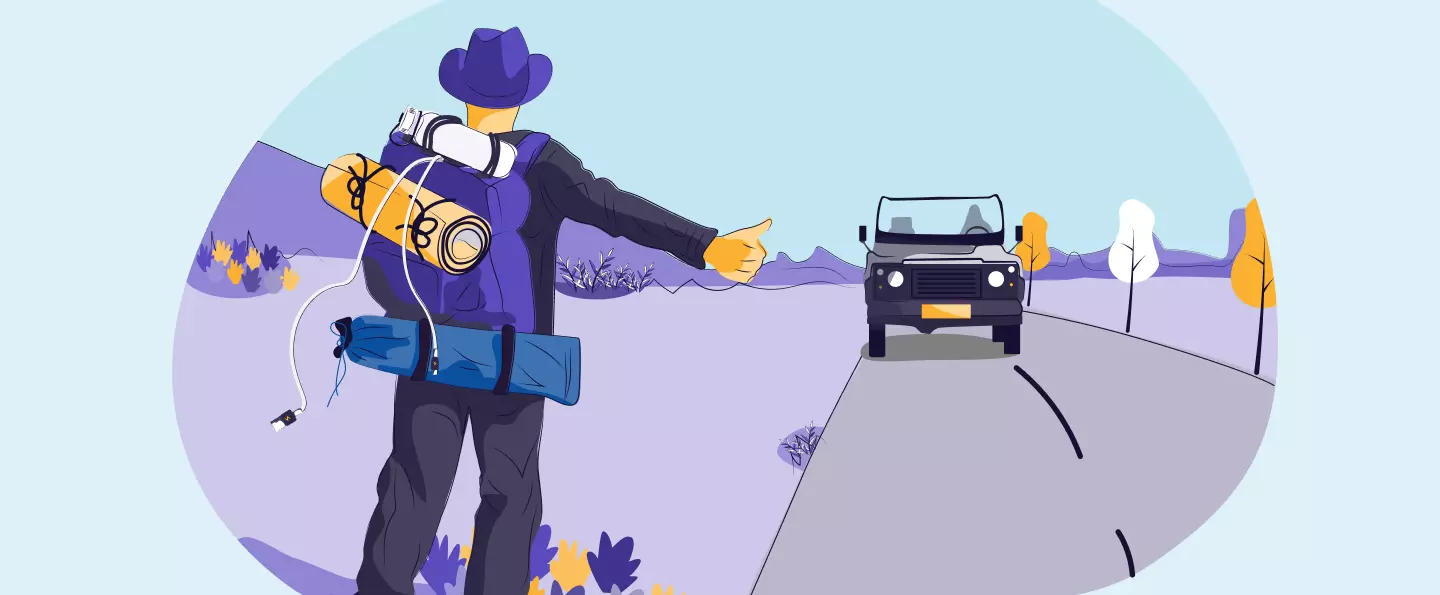Sending your data to our servers, please wait...





Oops... No results found.
Please try a different search phrase.
Remote Culture 12 min read
Bridging the Gap: Incorporating Travel into Education, Work, and a Meaningful Life
Written by Dallin Porter
Marketing Director @ Galactic Fed
Expert reviewed by Dallin Porter
Marketing Director @ Galactic Fed
Published 18 May 2020
It should come as no surprise that Galactic Fed, being a completely remote company, truly believes in the power of travel. The experiences and life lessons that are possible when one goes out into the world are second to none, and something integral to the DNA of our organization. With this in mind, we spoke with author Oliver Sandrueter about his new book, Bridging the Gap: Incorporating Travel into Education, Work, and a Meaningful Life. The book features Galactic Fed Co-Founder, Zach Boyette about his decision to work remotely while travelling the world, and provides insight into why travel can deeply enrich your life.
Can you give some background on your travel experience, what led you to do choosing a gap year, and ultimately what led you to get the idea to write this book?
Toward the end of high school, I was sitting in my driveway when I received an acceptance email from what I thought was my dream university. I had been constantly working over the years for this moment but I remember feeling somewhat indifferent about the email. I was excited, but I questioned if all the work was truly worth it and what my motivations had been along the way.
At that moment, I decided I would do something different that no one had encouraged up to that point. That “something” became my first gap year, traveling across ten countries over nine months. Since then, I’ve pursued multiple gap year experiences living and traveling in places around the world. I wrote Bridging the Gap to encourage people to seek out travel and show that you can incorporate travel into any lifestyle at any point in an education or career journey.
What’s your advice for someone considering a gap year but maybe nervous, overwhelmed or doesn’t know where to start?
Start small. A gap year doesn’t need to be a massive leap into the unknown where you leave everything behind and start anew. It can be, but often, it starts with a simple commitment to yourself to try something different. Plan out a week-long trip where you separate yourself from whatever your day-to-day might be. It could be a week camping away from work, a handful of days road tripping to a new part of the country, or flying to a place you’ve always wanted to visit but never made the time.
The week will give a taste of what it’s like to take adventure into your own hands. Use it as motivation to start planning out what a longer commitment could look like. Every gap year will be different but each should be fueled by curiosity and passion that typically hides dormant inside our busy routines. Brainstorm a list of five things and five places that have always interested you. The list doesn’t need to make sense or add up yet - just get the ideas flowing and on paper.
Let a friend or family member know that you’re thinking about taking time to pursue something different and share your list with them. Bounce ideas around together and pretty soon your list will start narrowing itself down and you’ll have someone to keep you motivated as you plan things out and commit to your next adventure.
Did you find any correlations between mental health and travelling/gap years?
Definitely. A large amount of research is out there demonstrating how taking time to travel and pursue gap year experiences has positive effects on mental health and well-being. These experiences rejuvenate inspiration and excitement for life which is often sorely needed in the grind of today’s world.
What are some of the main skills you find you learn or develop during a Gap Year/Travel?
Resiliency, creativity, and empathy.
Things often don’t go quite according to plan while traveling. You end up in situations without much of the typical comforts you’ve come to rely on be it routines, foods, directions, or cultural norms.
Creativity comes when you find out different ways around these obstacles. You learn to plan and alter plans independently and are exposed to a variety of ways to go about doing that. Your mind has much more time to wander and explore ideas you otherwise would’ve been too busy to lean into.
After seeing different parts of the world and living in places other than whatever was previously called home, I believe you develop a stronger sense of empathy. It’s much easier to appreciate and value the perspective of others once you’ve walked a bit in their environment. Feeling lost at times makes you much more akin to lend a hand to others whenever they may similarly be in need of some help.
Any advice on alternatives for people to “scratch” their travel itch during COVID?
Great question and one I’m still working on myself. I’ve found that camping and spending time outdoors has been helpful. It reminds me how much the environment right around us has to offer and is a great way to explore a bit.
Reading and watching different travel-based stories also transports my mind for a while. I finish with an even bigger itch than before but it’s nice to get lost in a travel story for a time.
Last thing I would add is to do some memory logging. I’ve been going back through old travel photos/videos and it’s been awesome to slow down and appreciate all the memories. Right now I’m attempting to catalog them a bit in little picture books or movies and it’s been pretty fun.
How can businesses and companies tap into this idea and implement or encourage travel into their culture?
This was a major focus of the book and one I’m really passionate about. The workforce is increasingly looking for these types of travel experiences and flexibility so the quicker a company adapts, the better it can attract top talent.
A side-effect of COVID has been the demonstration of just how much work can be completed remotely. The move toward encouraging remote work saves everyone time and allows people to do their best work from whatever place makes them feel most energized (which often includes travel).
I think the most low-hanging fruit though is simply requiring employees utilize paid time off and vacation days. In researching for my book, I found that an alarming amount of the workforce doesn’t use the entirety of their provided vacation/PTO despite multiple studies demonstrating the value to both employee and employer when they do. Taking this step is a move in the right direction toward encouraging more travel and healthier well-being in the workplace.
Does a gap year/travel make you more employable? How does one reconcile gaps on a resume where they have travelled? How do they make this travel experience work in their favour?
100 percent. A gap year and travel experience signals an individual’s ability to adapt and adjust to different environments. Soft skills like adaptability, resilience, and creativity are constantly cited as the most needed attributes in the workplace that are simultaneously the most difficult to teach.
A gap year experience allows people to refresh and refocus their career priorities. It gives time to ensure that you’re setting off toward a path you find value and meaning in. Speaking to this confidence is essential to translating the value of travel into the value you bring to the workplace.
Pairing a gap year experience with the pursuit of a passion or skill set on the side will deliver an even more marketable skill set. The bulk of my book was written while traveling and it now serves me well in any interview. Not to mention, any travel experience is probably the best icebreaker and conversation point for an interviewer who has seen the same resume 100 times that day.
What correlations do you see between the importance of travel and remote work becoming more mainstream?
Travel generates meaningful and memorable experiences. It makes people feel invigorated and excited to wake up in the morning. When you pair the energy and benefits of travel with the ability to work remotely, you end up in a pretty ideal situation.
I think it’s important to remember that remote work doesn’t mean you have to be traveling all the time - it simply gives you the option to pursue travel whenever it feels best for you. The flexibility and efficiency of remote work provides huge benefits to employees and employers alike and I think we’re only seeing the tip of the iceberg when it comes to the prevalence of remote work.
How did you meet Galactic Fed Co-Founder Zach Boyette?
Back when I was in university at Vanderbilt, Zach messaged a group we were both in saying he would be stopping by campus. He mentioned he was working remotely, was in between travel experiences, and would be free if anyone wanted to meet up. I was in the middle of class when I got the message. I instantly sent him a text, left class early, and went to grab a coffee with him.
What do you find so compelling about Zach’s story? How does his story speak to the principles you write about in your book?
Zach once told me about a pivotal moment in his career journey where he decided he no longer wanted to make decisions out of fear and instead make them out of logic, opportunity, and passion. After making this commitment, he went on to build the amazing company, community, and life he enjoys now. I think that idea of not allowing fear or the general inertia of life to dictate your path is at the core of Bridging the Gap. I’ve always respected how Zach decided to lean into what he knew would deliver the most fulfilling results in life - regardless of what was or wasn’t standard procedure - and I hope myself and those who read Bridging the Gap can do the same.
What lessons can someone take away from Zach’s story?
To pursue the path that makes you feel most alive. Zach had a career route lined up that was stable, well-respected, and generally sought after. He decided to pivot from it and drive toward what he felt passionate about. That will likely look different for everyone, but the practice of making independent decisions and listening to yourself is a lesson anyone can take away from Zach’s story.
How do you see travel fitting into the future of work? (ie with more companies going remote/working from home)
I think travel is a huge part of the future of work. As work continues to globalize and become interconnected, the workforce will follow suit. I believe we’ll look back on the days of lengthy commutes to massive office buildings and wonder what the hell we were thinking. Travel provides value to individuals and remote work provides value to employers. The two generate a far better picture for most work environments and we’re seeing tangible proof of that in so many companies that have already embraced remote work and WFH standards.
What’s next for you? Where to next?
All this time in quarantine has left me with a pretty extensive travel list by now. I’m thinking a trip across the Trans-Siberian Railroad could be a cool way to cover some ground once we’re allowed out of the house again.
Order the book and begin your own adventure. Purchase Bridging the Gap: Incorporating Travel into Education, Work, and a Meaningful Life by Oliver Sandreuter here.

Dallin Porter
Marketing Director @ Galactic Fed



